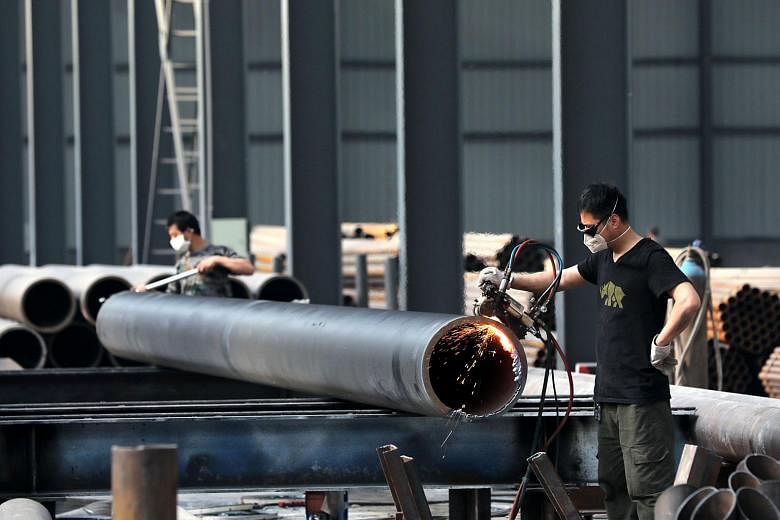BEIJING (REUTERS, BLOOMBERG) - China will fight back firmly with "qualitative" and "quantitative" measures if the United States publishes an additional list of tariffs on Chinese goods, the commerce ministry said on Tuesday (June 19), accusing the US of initiating a trade war.
US President Donald Trump threatened on Monday to impose a 10 per cent tariff on US$200 billion (S$270 billion) of Chinese goods, saying the move was in retaliation for China's decision to raise tariffs on US$50 billion in US goods.
"Such a practice of extreme pressure and blackmailing deviates from the consensus reached by both sides on multiple occasions, and is a disappointment for the international community," the ministry said in a statement.
"The United States has initiated a trade war and violated market regulations, and is harming the interests of not just the people of China and the US, but of the world," the ministry said.
If the US publishes a new list of tariffs, Beijing will take strong countermeasures to safeguard the interests of China and its people, the ministry added.
Markets soured on the news, with Asian stocks and US equity futures trading lower while safe havens including the yen, gold and Treasuries climbed.
China's Foreign Ministry on Tuesday also urged the US to stop its damaging words and deeds. Ministry spokesman Geng Shuang made the comment at a regular news briefing, adding that China did not want a trade war but was not afraid of one.
In a White House statement on Monday evening, Trump said that he had instructed the US Trade Representative's office to identify US$200 billion in Chinese imports for additional tariffs of 10 per cent. He said the US would impose tariffs on another US$200 billion after that if Beijing retaliates.
"The United States will no longer be taken advantage of on trade by China and other countries in the world," he said. "We will continue using all available tools to create a better and fairer trading system for all Americans."
The developments suggest a deepening trade dispute that the International Monetary Fund has described as one of the biggest risks to global growth.
While the hit to growth around the world has so far been limited, the danger is that confidence and sentiment will soon start to sour and limit corporate expansion and investment plans.
"The US-China trade war is escalating rapidly," said Rajiv Biswas, Asia Pacific chief economist at IHS Markit in Singapore. "The collateral damage from an escalating US-China trade war will be widespread."

If implemented, Trump's tariffs would mean a sizable amount of Chinese goods shipped to the US would be exposed to new tariffs and raises questions about the impact on American consumers.
Economists warn that higher prices on imported goods could dampen consumer sentiment and pressure inflation.
The latest salvo came as Trump seeks to convince US lawmakers to let Chinese telecom company ZTE Corp. remain in business.
Earlier this month, the Trump administration gave ZTE a reprieve after the company agreed to pay fines, change management and allow American oversight.
ZTE's survival has been a key goal of Chinese President Xi Jinping.
The Senate passed legislation on Monday evening that would restore penalties on ZTE.
The US imported US$505 billion of goods from China last year and exported about US$130 billion, leaving a 2017 trade deficit of US$376 billion, according to US government figures.
The fact that America imports more from China will make it harder for Beijing to match Trump's attacks, according to Derek Scissors, a resident scholar at the conservative American Enterprise Institute in Washington who focuses on China. "All they can do is impose higher tariffs on a smaller subset of products," he said.
That being said, "China is going to retaliate", he added.

